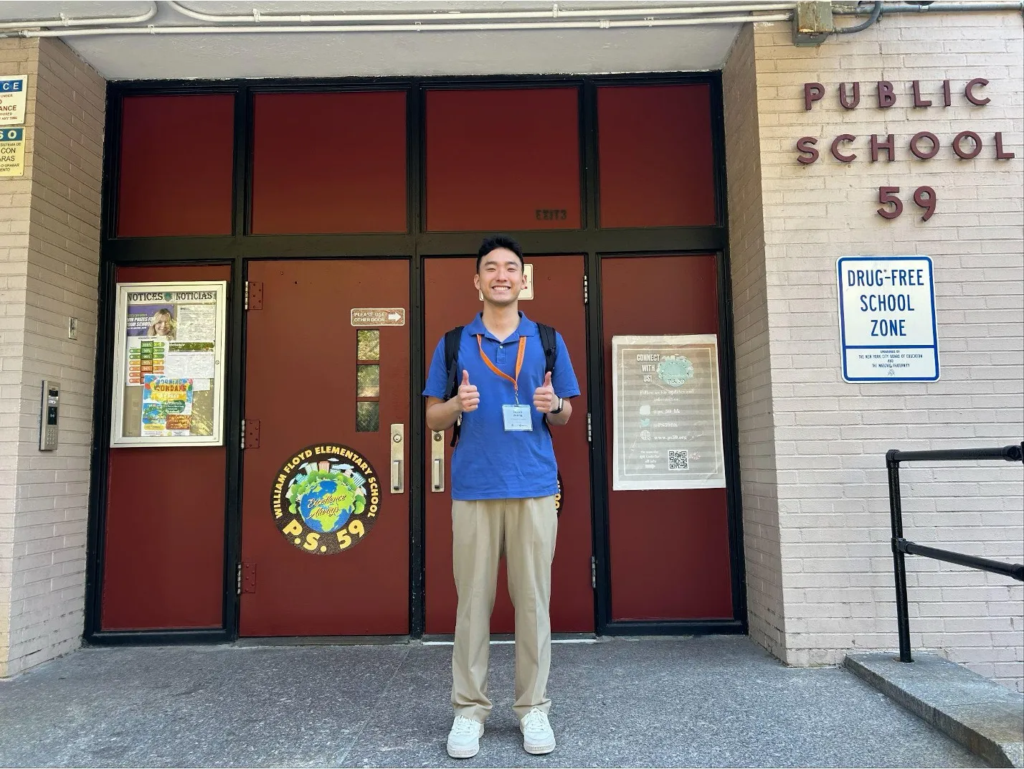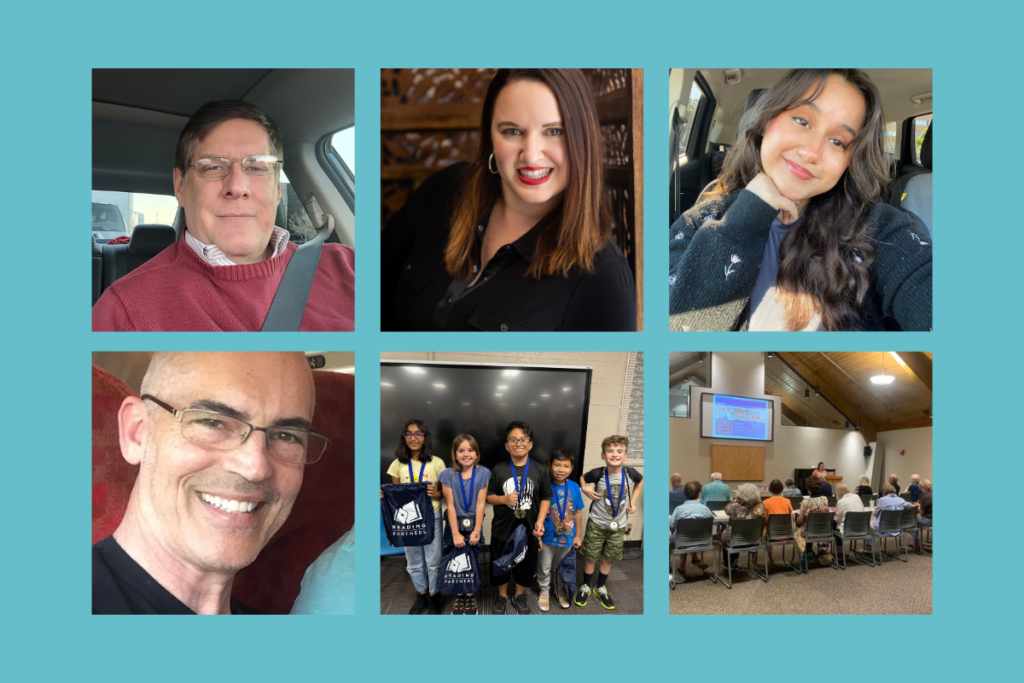.
This entry was posted in News, Stronger Together on
Reading Partners, this week’s Battery/Blackbaud Inc. Nonprofit of the Match, is a national literacy organization founded in 2001 in California that opened its only South Carolina operation in Charleston two years ago.
Its simple, proven concept is easy enough to understand: Identify children in low-income schools who are falling behind in reading and pair them up with a trained volunteer tutor once a week. Years of data and multiple independent analyses confirm that the program is not only effective at improving students’ reading performance, it’s also extremely cost-effective.
We checked in with Kecia Greenho, executive director of Reading Partners in Charleston, to find out more.
CB: Reading Partners got its start here in conjunction with a program called Book Buddies. What was that? Who started it? How was that program different from what you do now?
KG: An organization called Charleston Volunteers for Literacy (CVL), was created in partnership with Coastal Community Foundation and Charleston County School District. CVL brought Book Buddies to Charleston from the University of Virginia to provide literacy intervention to low-income second- and third-grade students who were at risk of reading failure.
At its peak, Book Buddies was serving 96 students in eight Title I elementary schools, and its founders knew that the need was greater than the 96 students it was serving. Our merger with Reading Partners allowed us to increase the capacity of our program. We will now be serving 675 students at 16 schools in three counties.
CB: Reading Partners got its start in California and had an extremely limited footprint in the South before opening in Charleston in 2013. Why Charleston?
KG: The expansion to the Charleston region was an easy decision for Reading Partners. The local Book Buddies program was already operating with a very similar program structure, but most importantly we had established partnerships with the school district and local funders and had a robust volunteer base that was invested in the mission to improve reading for elementary students in the Charleston area. Charleston Book Buddies reached out to Reading Partners because we saw a need to be able to sustainably scale our program, and the RP program model fit with the current model.
CB: Reading Partners emphasizes that tutors follow a curriculum in dealing with children in the program, but also says that it customizes to each child. How does that work?
KG: The Reading Partners curriculum is an evidence-based program built on solid research on how to intervene with students who are at risk of reading failure. There are often times when a student needs supplemental activities or further work with a specific skill. Through testing, tutor feedback, and observation, we can figure out what needs each student has. We then have dedicated literacy professionals who work on-site at our schools who provide the literacy expertise to make these individualized adjustments.
CB: Your organization puts a lot of emphasis on results and testing. Why?
KG: We want to make sure that the literacy interventions we use make a tangible and measurable difference in each student’s life. By testing students three times throughout the year, we are making sure each student is receiving the exact intervention he or she needs, which ultimately produces results that will begin to move the needle on literacy across the state.
CB: How many volunteers do you have here in Charleston?
KG: Currently we have more than 600 volunteers in Charleston. By the end of our program in May of 2016, we hope to have 975.
CB: What do volunteers do? Do they get to pick their age group? Their school?
KG: Volunteers are the heart and engine of our program. By showing up to our centers every week, volunteers help students make measurable improvements in their reading.
 Volunteering is easy. We provide the structured curriculum, which outlines exactly what the tutor and student should be doing throughout the lesson. Lessons are really a back-and-forth between tutor and student. Tutors explain directions, make sure students understand the concept, and model what great reading sounds like. Students demonstrate that they understand the lesson concept by reading aloud to the tutor and answering questions and actively participating in conversation throughout the lesson.
Volunteering is easy. We provide the structured curriculum, which outlines exactly what the tutor and student should be doing throughout the lesson. Lessons are really a back-and-forth between tutor and student. Tutors explain directions, make sure students understand the concept, and model what great reading sounds like. Students demonstrate that they understand the lesson concept by reading aloud to the tutor and answering questions and actively participating in conversation throughout the lesson.
Volunteers usually sign up through our website or call our volunteer line. When they talk to one of our volunteer coordinators, they’ll get the chance to pick a school location, talk about their preferences as far as what age group they would like to work with, and they’ll also select a time of day that is most ideal to volunteer.
After training is complete, volunteers are assigned a session time and student. Their first day at Reading Partners will be spent getting to know their student and then every lesson after that, they’ll work to keep their student moving through the curriculum, lesson-by-lesson. The entire time volunteers are working with students, a site coordinator will be circulating throughout the room to offer support for any questions or concerns.
CB: How long does it take to train up to be a Reading Partners volunteer?
KG:Typically it will take a couple of weeks from the time that the volunteer signs up to get them in the center and started with a student. There is no cost to volunteer with our program. The training includes an organizational overview, curriculum overview and shadow session where the tutor is able to visit the center and observe an experienced student-tutor pair.
CB: Why is there a requirement that volunteers get a criminal background check, and how much do volunteers have to pay?
KG: Our strong relationships with partner school districts allows us to waive the criminal background check cost for our tutors. We issue the criminal background check to align with school district protocols and also ensure the safety of our students.
CB: Do most volunteers tutor only one child, or more than one?
KG: Typically tutors work with one child throughout the year, but if they want to sign up for more sessions to work with multiple students, we would oblige!
KG: We want our students to be excited about reading; that’s why we give them the ability to choose the books they will read throughout the lesson. Students practice their read-aloud skills by picking a book from our curriculum packet. Usually there are two different books that they can choose from in this portion of the lesson. The last 5 minutes of the lesson are spent with the tutor reading aloud from a book the student picked out from our read-aloud library.
CB: What qualities make a good Reading Partners tutor?
KG: A good Reading Partners tutor is, above all, committed to helping children realize their full potential. Other important qualities: Tutors should have at least one hour a week to dedicate to the program and should plan to consistently meet with their student during this hour each week. They should be enthusiastic about sharing knowledge, especially with K-5 students.
CB: You work with under-privileged children at schools that serve a lot of low-income families. Why? What special challenges do these families and children face? How does a human connection between a volunteer and a student work to overcome those disadvantages?
KG: According to the Tri-County Cradle to Career Regional Education Report (2015), 1,400 third grade students in the Tri-County region were not reading at grade level proficiency. Stats like this are alarming. More alarming is that the report further indicates that the outcomes for students from lower income families are considerably less, with 27% not reading at grade level by third grade, and escalating to 41% below grade level by eighth grade. For these children, 26% will not graduate on time.
We want to see all children succeed in school and in life; our mission is to provide them with the literacy skills they need to live a fruitful life. We believe the key to unlocking this opportunity is through one-on-one attention, and research has shown us that when students are paired with a community volunteer their reading skills AND confidence grow. The reading tutor becomes more than just a “tutor” – they are a role model and friend. Every day we hear stories about the amazing things our students and tutors are accomplishing together.
Here is one of my favorites: India was a shy, hesitant third grader at Angel Oak Elementary. She lacked confidence in her reading abilities and so India was referred to our program. Her tutor, Mr. Jesse, made Reading Partners a safe space for India, and because of that, her confidence bloomed. When India started in our program, she was reading almost two years behind grade level. By the end of the year, she had not only caught up to grade level, she was reading above it.
CB: For Battery fans whose schedules don’t really allow for them to commit to an hour every week: What else can they do to help?
KG: Become a partner. Reading Partners is a non-profit that relies on the generosity of the community to fund our operations. It takes around $1,000 in private philanthropy to enroll a student in our program and $90,000 to get a school site up and running. Any contribution, large or small, makes a difference!
Or become an advocate. Help us spread the word about literacy by sharing with your friends about our cause.






